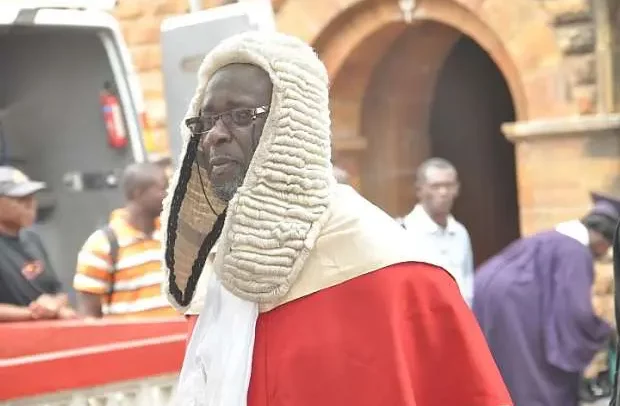Justice Paul Baffoe-Bonnie
Parliament has approved the nomination of Justice Paul Baffoe-Bonnie as the new Chief Justice following a heated debate and a contested voting process in the House yesterday.
The approval came after a head count which saw 163 Members of Parliament voting in favour and 69 against, following a challenge by the Minority to the initial voice vote declared by the Speaker.
Deputy Whip of the Minority, Habib Iddrisu, subsequently demanded a division vote, but Speaker Alban Bagbin rejected the request, ruling that “a division has been unnecessarily claimed.”
Declaring the outcome, the Speaker stated, “This House has accordingly approved the nomination of Justice Paul Baffoe-Bonnie in accordance with the Constitution.”
Minority
The debate preceding the vote reflected deep partisan divisions, with the Minority Leader, Alexander Afenyo-Markin, expressing strong reservations over the process leading to the nomination.
He argued that the removal of former Chief Justice Gertrude Araba Esaaba Torkornoo had been fraught with constitutional irregularities and unresolved legal challenges.
Mr. Afenyo-Markin said the Minority could not in good conscience endorse the new nominee when “critical questions about the constitutional validity and procedural regularity” of Justice Torkornoo’s removal remained unanswered.
“The Minority holds the view that there has been inconsistency in the approach to this matter. If care is not taken, this country may not attract the needed investment because of the uncertainty surrounding such constitutional processes,” he cautioned.
He added that key reports relating to the removal of Justice Torkornoo, including the prima facie findings of the Council of State and the recommendations that informed the President’s decision, had not been made public, undermining transparency and accountability.
“For purposes of democratic transparency, it would have been proper to publish the report. We are dealing with a matter involving another arm of government, the judiciary, and citizens deserve access to that information,” he argued.
Mr. Afenyo-Markin further criticised the Attorney General’s handling of ongoing court cases concerning Justice Torkornoo’s removal, accusing him of acting in “bad faith” by failing to file timely responses. He insisted that the Minority’s opposition was based on principle, not politics.
“We maintain our position. We reject this nomination, and we will demand a secret ballot to register our dissent,” he declared.
Majority
However, the Majority Leader, Mahama Ayariga, countered that Parliament had a constitutional duty to proceed with the approval, noting that ongoing court challenges would not nullify parliamentary processes.
Drawing parallels to past presidential election petitions, Mr. Ayariga said, “In 2012 and 2020, despite pending court cases, those declared winners by the Electoral Commission were sworn in. The courts later made their rulings, and the system respected them. The same principle applies here.”
He emphasised that Justice Baffoe-Bonnie had demonstrated humility and readiness to abide by any eventual court ruling in the matter of his predecessor.
“The Chief Justice nominee has said he is ready to give way should the courts rule otherwise. That’s the essence of rule of law,” Mr. Ayariga noted.
He also praised the nominee’s credentials, describing him as “eminently qualified” under Article 128(4) of the Constitution, with over 30 years of judicial experience and more than a decade on the Supreme Court.
Mr. Ayariga reminded the House that judicial appointments had historically transcended political divides.
“Under President Atta Mills and President Mahama, both of the National Democratic Congress (NDC), Chief Justice Georgina Theodora Wood, appointed by a New Patriotic Party (NPP) president, served without conflict. That is how constitutional democracy works,” he said.
Following the debate, the Speaker put the question, leading to the 163–69 outcome that confirmed Justice Paul Baffoe-Bonnie as the country’s 15th Chief Justice.
Justice Baffoe-Bonnie succeeds Justice Gertrude Torkornoo, whose removal and ongoing legal challenge have generated intense national debate about judicial independence and constitutional procedure.
By Ernest Kofi Adu, Parliament House


